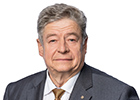Discussion of the Crucial National Issue: "How to Ensure the Future of Veterinary Medicine"
Session: 15th Riigikogu, 3rd session, plenary session
Date: 2024-04-11 13:03
Participating Politicians:
Total Speeches: 117
Membership: 15
Agenda Duration: 2h 50m
AI Summaries: 117/117 Speeches (100.0%)
Analysis: Structured Analysis
Politicians Speaking Time
Politicians
Analysis
Summary
The presentation session addressed a nationally important question: "How to ensure the future of veterinary medicine," and its connections to food security, animal welfare, and human health and the economy. The discussion, initiated by the Rural Affairs Committee, focused primarily on the shortage of veterinary education, the insufficient number of graduates, and how to ensure a sustainable veterinary service in the treatment of both small and large animals. The discussion points included the role of funding (involving the state, the Ministry of Education and Research [HTM], the private sector, and entrepreneurs), the role of Estonian and English language instruction, the development of the clinical base and animal clinics, and the security of Estonian rural life and food production. Speakers pointed out that increasing the number of graduates cannot happen without appropriate financing and substantive cooperation with the sector; furthermore, the need to think more broadly was emphasized—food security, environmental sustainability, and the alleviation of veterinarians' workload and stress. At the end of the discussion, it was stressed that no decisions were adopted, and consequently, the matter remains with the respected veterinarians of the speaker session and must be further discussed through cooperation at various levels.
Decisions Made 1
No decision is adopted upon the conclusion of the debate. The Riigikogu did not adopt a decision during this sitting, and based on the study and the discussions held, work must continue on further steps and potential funding and organizational solutions.
Most Active Speaker
The most active speaker during this session was Urmas Kruuse, the Chairman of the Rural Affairs Committee. He intervened multiple times during the introductory remarks and question-and-answer segments, moderated the debate, and offered significant critical insights and observations regarding the future of veterinary medicine and the state's role in that sector. Politically, he belongs to the Reform Party, which signifies a more right-wing/right-leaning political orientation (right-wing).
Aseesimees Jüri Ratas
AI Summary
Today, a matter of national importance initiated by the Rural Affairs Committee, "How to ensure the future of veterinary medicine," is being debated. Urmas Kruuse, Valdeko Paavel, Ants Noodi, and Ülle Jaakma will be speaking, and question-and-answer rounds will be held, but the Riigikogu will not adopt a decision at the end.

Urmas Kruuse
Profiling Eesti Reformierakonna fraktsioonAI Summary
Urmas Kruuse marked the 175th anniversary of Estonian veterinary medicine and highlighted the growing shortage of veterinarians—a critical issue for ensuring animal welfare and food security. He noted that this shortage stems from low salaries, long and costly education, and regulated professional qualifications. Furthermore, he called on the Riigikogu and the government to work together to find sustainable solutions through private sector engagement and improved funding.
Aseesimees Jüri Ratas
AI Summary
Jüri Ratas thanks the speaker, requests them to remain, and emphasizes that even the initiator of the debate must answer questions from the members of the Riigikogu. Priit Sibul, you have the floor!

Priit Sibul
Profiling Isamaa fraktsioonAI Summary
Priit Sibul discusses issues of animal welfare in society and asks whether the solutions lie in education or broader attitudes, pointing to the shortage of students and veterinarians and the reasons for this, both in the general context and specifically at the level of the educational field of the university of life sciences.

Urmas Kruuse
Profiling Eesti Reformierakonna fraktsioonAI Summary
Urmas Kruuse emphasized that animal welfare is a complex and multifaceted topic that requires a comprehensive solution, because the shortage of veterinarians, low salaries, and heavy workload, along with the long study period, make the profession difficult, and the focus must be on animal health and the environment.
Aseesimees Jüri Ratas
AI Summary
Deputy Speaker Jüri Ratas asks Enn Eesmaa to present his question again.

Enn Eesmaa
Profiling Fraktsiooni mittekuuluvad Riigikogu liikmedAI Summary
Enn Eesmaa thanked his colleague for the overview and for raising the issue, emphasized that he did not want an accusatory tone, noted the Reform Party's background and efforts to alleviate remuneration issues, and stated that progress was still far off, asking for a couple of examples of what has hindered the implementation of good ideas.

Urmas Kruuse
Profiling Eesti Reformierakonna fraktsioonAI Summary
Urmas Kruuse stressed that sustainable funding for veterinary education and closer cooperation between ministries and universities are crucial, given that veterinary medicine is just as vital as medical training, and its development hinges on funding, practical experience, and the overall societal context.
Aseesimees Jüri Ratas
AI Summary
This is a very short utterance, where the speaker says, "Anti Allas, please."

Anti Allas
Profiling Fraktsiooni mittekuuluvad Riigikogu liikmedAI Summary
Anti Allas thanks the Chair and the rapporteur, emphasizes the importance of the sector, and mentions his personal connection to it as the son of a veterinarian. He then asks whether this situation is specific to Estonia or how it appears in other places, whether the problems are universal or dependent on the size of the market, and what exactly is causing this state of affairs.

Urmas Kruuse
Profiling Eesti Reformierakonna fraktsioonAI Summary
Urmas Kruuse points out that while preparing his presentation, he didn't extensively research the experiences of other countries, but similar problems exist elsewhere. Several dozen Finns receive their education in Estonia, paying for their studies themselves, but they don't stay here to work. This puts pressure on us and raises the question of how we will finance the remaining study places if we accept fewer Finns. All these issues are interconnected.
Aseesimees Jüri Ratas
AI Summary
Jüri Ratas thanked the speaker, announced that the time limit had expired, and invited Valdeko Paavel, the president of the Estonian Chamber of Veterinarians, to the Riigikogu rostrum as the next presenter.
Eesti Loomaarstide Koja president Valdeko Paavel
AI Summary
Valdeko Paavel emphasized that the number and age profile of veterinarians in Estonia are critical. He stressed that it is absolutely essential, as a matter of national priority, to secure increased funding for the continuation of Estonian-language veterinary education, to expand the number of study places, and to ensure that graduates remain working in Estonia, all in order to guarantee animal and human health and maintain food hygiene standards.
Aseesimees Jüri Ratas
AI Summary
Jüri Ratas thanks the President, explains that the address is the main presentation and there will be no co-presentation, thanks the speaker for the excellent presentation, and asks to proceed to questions.
Eesti Loomaarstide Koja president Valdeko Paavel
AI Summary
Valdeko Paavel, President of the Estonian Chamber of Veterinarians, asks if he can answer one previously heard question.
Aseesimees Jüri Ratas
AI Summary
Vice-Chairman Jüri Ratas stated that, under these rules, the authorization cannot be granted, and even long-serving Rector Mait Klaassen cannot confirm this at the moment. Therefore, we will proceed to the questions.

Tanel Kiik
Profiling Fraktsiooni mittekuuluvad Riigikogu liikmedAI Summary
Tanel Kiik asks what three specific things should be done in the veterinary sector to ensure the best long-term protection of human and animal health.
Eesti Loomaarstide Koja president Valdeko Paavel
AI Summary
Valdeko Paavel stressed that veterinary funding must be clearly strategic, heed the viewpoints of universities, and ensure sufficient resources to meet the needs of both the state and the private sector, as well as guarantee food and national security. He estimated that a relatively small sum is required for this annually.

Helmen Kütt
Profiling Sotsiaaldemokraatliku Erakonna fraktsioonAI Summary
Helmen Kütt thanked the chair, the president of the Chamber of Veterinarians, and the Rural Affairs Committee, noting that the work of veterinarians helps animals, owners, and their mental health. She concluded by asking how popular the veterinary profession is among young people.
Aseesimees Jüri Ratas
AI Summary
Deputy Speaker Jüri Ratas calls upon Helmen Kütt to take the floor.
Eesti Loomaarstide Koja president Valdeko Paavel
AI Summary
Valdeko Paavel emphasizes that the veterinary profession is over-romanticized, and the reality—with its emotional toll, numerous deaths, and failures—forces young people to choose the wrong career path and makes practicing very difficult.
Aseesimees Jüri Ratas
AI Summary
This is a request directed at Urmas Kruuse, asking him to come onto the stage and perform.

Urmas Kruuse
Profiling Eesti Reformierakonna fraktsioonAI Summary
Urmas Kruuse emphasizes the necessity of monitoring market trends and discusses what they are observing in the pet, agricultural, and large animal markets—whether wages are stagnating or growing steadily, and what the potential causes for these trends might be.
Eesti Loomaarstide Koja president Valdeko Paavel
AI Summary
Estonia is currently facing a significant shortage of veterinarians, which is likely to worsen over the next five to ten years. This is because people are reluctant to take on difficult work, including night shifts and weekends, and they experience high levels of stress. Although salary is important, it is clearly not the only motivating factor.
Aseesimees Jüri Ratas
AI Summary
This is a short request for Anti Allas.

Anti Allas
Profiling Fraktsiooni mittekuuluvad Riigikogu liikmedAI Summary
Anti Allas thanks the speaker and expresses his sincere respect, and asks again about the veterinary situation in neighboring countries: are there positive trends, and what can we learn from other countries?
Eesti Loomaarstide Koja president Valdeko Paavel
AI Summary
The report suggests that the shortage of veterinarians is a widespread problem across Europe and globally, driven by labor mobility as well as cultural and linguistic barriers. Furthermore, while there are exceptions in Southern Europe, attracting veterinarians to Estonia remains challenging.
Aseesimees Jüri Ratas
AI Summary
Deputy Speaker Jüri Ratas requests that Rene Kokk be granted the floor.
AI Summary
Rene Kokk noted that the shortage of veterinarians and people working with animals is deepening because young people primarily seek success as singers or influencers, and funding is lacking. If the government provided the money and a state mandate, would young people go study the profession, and would the study groups fill up?
Eesti Loomaarstide Koja president Valdeko Paavel
AI Summary
Valdeko Paavel emphasizes that veterinary training is very long, and graduates need additional time after school to work successfully on their own. Interest in the field is high, but before starting their studies, it is critical to show the candidate what a veterinarian's job actually involves—for example, working the reception desk at a small animal clinic, or working in state institutions and slaughterhouses. He states that introducing the actual content of the profession is critically important, and if the funding is secured, students for the specialty will definitely be found.
Aseesimees Jüri Ratas
AI Summary
Vice-Speaker Jüri Ratas invited Arvo Aller to the stage.

Arvo Aller
Profiling Fraktsiooni mittekuuluvad Riigikogu liikmedAI Summary
Arvo Aller pointed out that approximately two million [euros] are lacking to ensure high-quality veterinary education. Although this has previously been supported by the Ministry of Rural Affairs and the Ministry of Regional Affairs and Agriculture, it appears that the interest in this area is low under the Ministry of Education and Research. He then questioned whether this might be a conscious step taken by the state in the name of "green frenzy," arguing that if large agricultural animals disappear and the population switches to a plant-based diet, veterinarians won't be needed—except for those treating pets.
Eesti Loomaarstide Koja president Valdeko Paavel
AI Summary
Valdeko Paavel stated that he is likely not the right person to answer general questions, but he requested that people direct inquiries concerning animal welfare, their treatment, and prevention to him.
Aseesimees Jüri Ratas
AI Summary
Deputy Speaker Jüri Ratas invited Tiit Maran to take the floor.

Tiit Maran
Profiling Fraktsiooni mittekuuluvad Riigikogu liikmedAI Summary
He emphasizes that the work of veterinarians is of strategic importance in ensuring food security. However, the private sector is expanding and may draw prospective employees away from the public sector, which raises the question of whether there is a conflict between the two sides.
Eesti Loomaarstide Koja president Valdeko Paavel
AI Summary
Paavel emphasized that veterinarians themselves choose their career path and can try different avenues, and although the salary gaps are significant, pay is not the only motivator—personal preferences and stress tolerance are also important.
Aseesimees Jüri Ratas
AI Summary
Deputy Speaker Jüri Ratas invites Priit Sibul to take the floor.

Priit Sibul
Profiling Isamaa fraktsioonAI Summary
Priit Sibul emphasized that the discussion raises public awareness and asked what the most crucial step would be that politicians should take to solve this problem.
Eesti Loomaarstide Koja president Valdeko Paavel
AI Summary
The presentation first emphasizes listening to the presentations given by the board and the rector of the Estonian University of Life Sciences, as well as the concerns raised by dedicated employees; critically reviewing the impact of bureaucracy; cooperating with the state on education funding; and continuing discussion and feedback for at least the next ten years and even longer, so that this strategic sector can improve animal welfare and food safety in the long term.
Aseesimees Jüri Ratas
AI Summary
Deputy Speaker Jüri Ratas calls upon Mait Klaassen.

Mait Klaassen
Profiling Eesti Reformierakonna fraktsioonAI Summary
Mait Klaassen thanks the presenter and asks about the admission numbers for the Estonian-language veterinary medicine program—referencing the intake of about 100 students during the Soviet era—and ponders how large the future intake of students into the Estonian curriculum should be to ensure the sustainability of the profession.
Eesti Loomaarstide Koja president Valdeko Paavel
AI Summary
Valdeko Paavel emphasizes that we must stop the English-language veterinary training and instead fund the Estonian-language program. This is necessary because, of the roughly 70 students admitted annually, the majority are foreigners. Furthermore, space constraints necessitate replacing those studying in a foreign language with those studying in Estonian, which ultimately makes our future more secure.
Aseesimees Jüri Ratas
AI Summary
This is simply a request to call Riina Solman to the stage.

Riina Solman
Profiling Fraktsiooni mittekuuluvad Riigikogu liikmedAI Summary
Riina Solman asks whether the field of veterinary medicine can align itself with the visions of radical green activists, and whether animal husbandry being a major contributor to CO2 emissions, along with the transition to a plant-based diet, are genuinely being debated at the level of the Riigikogu.
Eesti Loomaarstide Koja president Valdeko Paavel
AI Summary
Valdeko Paavel emphasizes that the green transition is crucial in every sector, and veterinarians can contribute to it, even though he doesn't believe that cows are responsible for climate warming, and he points to Ants Noot's presentation for a better overview.
Aseesimees Jüri Ratas
AI Summary
Jüri Ratas thanked the speaker for the presentation and the answers, said there were no further questions, and asked Ants Noot to take the Riigikogu floor as the next presenter.
Eesti Põllumajandus-Kaubanduskoja juhatuse esimees Ants Noot
AI Summary
The sustainability of food production and rural life is directly dependent on the availability of veterinarians. Consequently, Estonia must increase the number of veterinary medicine graduates, boost both teaching staff and state funding, engage businesses to provide scholarships, and reduce the administrative burden. These steps are essential to guarantee food security, economic stability, and the well-being of rural regions.
Aseesimees Jüri Ratas
AI Summary
Jüri Ratas thanks the server, announces the question period, and states that Arvo Aller will begin the questioning.

Arvo Aller
Profiling Fraktsiooni mittekuuluvad Riigikogu liikmedAI Summary
Arvo Aller is asking if the claims about the downsides of rural living are actually true, pointing specifically to the concepts of urbanization and the 15-minute city. He stresses the high cost of infrastructure and questions whether this kind of viewpoint is sound given the context of Estonian national security.
Eesti Põllumajandus-Kaubanduskoja juhatuse esimees Ants Noot
AI Summary
Ants Noot stated that living in areas of dispersed settlement is not detrimental to the state or its citizens. While it may be more costly, people are resourceful and adapt, and some young families are moving to the country, placing value on nature, the local community, and food.
Aseesimees Jüri Ratas
AI Summary
Deputy Speaker Jüri Ratas invites Riina Solman to the stage.

Riina Solman
Profiling Fraktsiooni mittekuuluvad Riigikogu liikmedAI Summary
Riina Solman asks how to balance the pressure of the green transition and urbanization while promoting rural life and ensuring food security, and how to find a common vision in crisis situations.
Eesti Põllumajandus-Kaubanduskoja juhatuse esimees Ants Noot
AI Summary
Ants Noot points out that people are intelligent and capable of rational thought, but food isn't produced in the city, and raw materials absolutely have to be sourced from the countryside. Furthermore, he doesn't understand the appeals to move to the city, since living in the country and in nature is much more agreeable to him.
Aseesimees Jüri Ratas
AI Summary
The address is merely a request to invite Priit Sibul onto the stage.

Priit Sibul
Profiling Isamaa fraktsioonAI Summary
Priit Sibul stresses that, although there are differences of opinion regarding urban versus rural living, it is extremely important to boost cooperation between farmers and the defense sector—for instance, by purchasing potatoes directly from farmers for the needs of the defense forces—and asks whether this kind of cooperation has already been initiated.
Eesti Põllumajandus-Kaubanduskoja juhatuse esimees Ants Noot
AI Summary
Ants Noot stated that cooperation between agriculture and the Defense Forces exists and is continually improving. He added that domestic, decentralized food production is vital in a wartime situation, and the complexity surrounding borders and public procurements requires shared solutions. However, the Defense Forces and the Defense League are already utilizing Estonian products, and collaboration in the field of equipment and fuels has improved.
Aseesimees Jüri Ratas
AI Summary
Deputy Speaker Jüri Ratas invites Mait Klaassen to the stage.

Mait Klaassen
Profiling Eesti Reformierakonna fraktsioonAI Summary
Mait Klaassen claims that the additional two million euro allocation in the state budget for increasing student admissions is a gimmick that merely replaces revenue from tuition fees and doesn't actually improve the university. He also asks how the money can truly be directed into the sector and what the official position on this matter is.
Eesti Põllumajandus-Kaubanduskoja juhatuse esimees Ants Noot
AI Summary
He recommended considering fee-based education in Estonian and bringing in resources from outside the state budget, improving the admission and selection processes, and involving entrepreneurs through scholarship funds, all while simultaneously highlighting the more challenging aspects of the work.
Aseesimees Jüri Ratas
AI Summary
The Vice-Chairman invites Tiit Maran to speak.

Tiit Maran
Profiling Fraktsiooni mittekuuluvad Riigikogu liikmedAI Summary
Tiit Maran said that the need for veterinarians in food production will not disappear, and he disagrees with the claim that agriculture is always a friend of biodiversity, because the decline in open-field birds shows that something is wrong. Furthermore, the large amounts of nitrogen and phosphorus reaching the sea and the accumulation of pesticide residues threaten the environment and groundwater. He sets aside the Green Deal and asks whether agriculture can continue in the same way under current conditions, or if a change must be considered so that food is on the table and the environment is preserved.
Eesti Põllumajandus-Kaubanduskoja juhatuse esimees Ants Noot
AI Summary
Ants Noot confirmed that Estonian farmers have been engaged in environmentally sustainable production and sustainable food production for the sake of biodiversity for decades. The CAP (Common Agricultural Policy) has played a crucial role in funding this, and the use of plant protection products and fertilizers has significantly decreased. New technologies will be developed going forward, but decisions must be long-term and sensibly timed so that food production does not become detrimental to the environment.
Aseesimees Jüri Ratas
AI Summary
Deputy Chairman Jüri Ratas asks for Tanel Kiik to be called.

Tanel Kiik
Profiling Fraktsiooni mittekuuluvad Riigikogu liikmedAI Summary
Tanel Kiik asks how serious a problem the shortage of veterinarians actually is today, and how often situations occur where businesses urgently need extra staff but can’t find a vet anywhere.
Eesti Põllumajandus-Kaubanduskoja juhatuse esimees Ants Noot
AI Summary
Businesses face a significant shortage of specialists—agronomists, crop cultivation experts, and livestock specialists—and consequently, they sometimes have to make difficult choices where veterinary aid cannot be provided, even though such decisions are impossible to make when dealing with human beings.
Aseesimees Jüri Ratas
AI Summary
He asked Urmas Kruuse to speak.

Urmas Kruuse
Profiling Eesti Reformierakonna fraktsioonAI Summary
Urmas Kruuse believes that tuition-free education may not be sustainable, but suggests that the government order for veterinary studies should be increased, while other specialties could require tuition fees, and he asks whether his line of thinking is flawed.
Eesti Põllumajandus-Kaubanduskoja juhatuse esimees Ants Noot
AI Summary
He notes that this is an observation, not a question, and calls for analyzing and considering the recently proposed, more sensible solution for veterinary medicine.
Aseesimees Jüri Ratas
AI Summary
Deputy Speaker Jüri Ratas calls Pärtel-Peeter Pere to the stage to speak.
Pärtel-Peeter Pere
AI Summary
He raised the question of whether, despite studies showing a smaller environmental footprint in cities and 70% of carbon emissions originating there, focusing the green transition primarily on urban areas would unduly restrict the flexibility and appeal of rural life.
Eesti Põllumajandus-Kaubanduskoja juhatuse esimees Ants Noot
AI Summary
I completely agree, because simpler and easier solutions help in the energy, residential, and transport sectors, and while Estonian agriculture accounts for about 11% of total emissions, it isn't the largest portion.
Aseesimees Jüri Ratas
AI Summary
Vice-Chairman Jüri Ratas addresses René Kokk and asks him to speak.
Eesti Põllumajandus-Kaubanduskoja juhatuse esimees Ants Noot
AI Summary
The presentation highlighted that solutions are multifaceted, and to achieve success, businesses, the university, and the state must contribute collaboratively. Furthermore, the university is currently taking the lead and must continue active cooperation to ensure progress.
Aseesimees Jüri Ratas
AI Summary
Deputy Speaker Jüri Ratas asked that Anti Allas be given the floor.

Anti Allas
Profiling Fraktsiooni mittekuuluvad Riigikogu liikmedAI Summary
Anti Allas asks the presenter to comment on whether the Estonian tax environment affects the 41% self-sufficiency rate of vegetable production. He also asks about the extent of the administrative burden and excessive domestic regulation faced by farmers, how much this could be reduced, and whether the presenter has a list detailing these points.
Eesti Põllumajandus-Kaubanduskoja juhatuse esimees Ants Noot
AI Summary
The core message of the presentation is that the tax environment affects competition, and a lower VAT rate ultimately reaches the consumer. However, the increase in bureaucracy and controls complicates the situation. To mitigate this, an agreement has been reached with the ministry to reduce the administrative burden, and the first positive results are already visible.
Aseesimees Jüri Ratas
AI Summary
Jüri Ratas thanked the rapporteur and invited Ülle Jaakma, the Rector of the Estonian University of Life Sciences, to the Riigikogu podium to deliver her presentation.
Eesti Maaülikooli rektor Ülle Jaakma
AI Summary
The presentation emphasized that to ensure the quality and funding of veterinary training, the intake for Estonian-language veterinary studies must be increased to approximately 40 graduates annually. Achieving this requires significant cooperation between the public and private sectors and necessary investments, the impact of which will only become apparent after six to seven years.
Esimees Lauri Hussar
AI Summary
Chairman Lauri Hussar thanks the presenter and announces that there are questions, and the first questioner is Rene Kokk.
AI Summary
Rene Kokk criticized the Ministry of Education and Research's stubbornness and asked at whose expense the funds, which were shuffled around within the university, were allocated for veterinary medicine, and what would consequently remain undone.
Eesti Maaülikooli rektor Ülle Jaakma
AI Summary
Over the past two years, higher education funding has increased by 15%, enabling budget prioritization. Furthermore, our Institute of Veterinary Medicine and Animal Husbandry has also found ways to generate its own income through paid tuition and services rendered.
Esimees Lauri Hussar
AI Summary
The Chairman called upon Urmas Kruuse to speak.

Urmas Kruuse
Profiling Eesti Reformierakonna fraktsioonAI Summary
Urmas Kruuse noted that the university of life sciences holds a high position in international competition, and the discussion centers on whether international studies should be scaled back. However, the actual goal is not to reduce English-language instruction, but rather to increase the proportion of Estonian-language instruction in line with the needs of the state.
Eesti Maaülikooli rektor Ülle Jaakma
AI Summary
Rector Ülle Jaakma said that English-language instruction will not be restricted, because both Estonian- and English-language studies enrich the students, and international instruction motivates and develops both students and faculty. Furthermore, it is beneficial for veterinary studies and the university as a whole. If possible, we would increase the number of admissions for Estonian-language students.
Esimees Lauri Hussar
AI Summary
Chairman Lauri Hussar addresses Tanel Kiik and asks him for something.

Tanel Kiik
Profiling Fraktsiooni mittekuuluvad Riigikogu liikmedAI Summary
Tanel Kiik is inquiring about the funding of veterinary medicine and what parliament could do, beyond just providing money, on a legislative level to help popularize the profession and make the work of veterinarians more efficient.
Eesti Maaülikooli rektor Ülle Jaakma
AI Summary
Rector Ülle Jaakma emphasized that the deficit in funding for Estonian higher education and science, coupled with the necessity of a long-term plan, affects the quality of our universities, including veterinary education. She stressed that we must discuss the possibilities of private funding, tuition fees, and tax policy incentives, which could alleviate the pressure on state funding and ensure international recognition.

Tiit Maran
Profiling Fraktsiooni mittekuuluvad Riigikogu liikmedAI Summary
Tiit Maran emphasized that the university of life sciences needs support to maintain a high professional standard, both in developing agriculture and the bioeconomy and in conducting research. In addition to training veterinarians, the university must also engage in scientific research, while simultaneously asking how significant an impact continuing education could have on the activity levels of veterinarians.
Esimees Lauri Hussar
AI Summary
The Chairman asks Tiit Maran to take the floor.
Eesti Maaülikooli rektor Ülle Jaakma
AI Summary
Ülle Jaakma said that there are many women among veterinarians, and young female graduates often stay home with children. However, if a system of further training or refresher courses were established, dozens upon dozens would consider returning to clinical practice, and while those numbers need to be verified, the most important thing is to encourage young people.
Esimees Lauri Hussar
AI Summary
Chairman Lauri Hussar calls upon Arvo Aller to speak.

Arvo Aller
Profiling Fraktsiooni mittekuuluvad Riigikogu liikmedAI Summary
Arvo Aller highlighted the history of state investments between 2004 and 2008, as well as the necessity for veterinary medicine accreditation in 2025, noting 2.8 million allocated for the Kreutzwaldi 62 study building and 2.7 million for the Märja experimental base, and subsequently inquiring about the estimated budget required for the new accreditation period in veterinary medicine.
Eesti Maaülikooli rektor Ülle Jaakma
AI Summary
Rector Ülle Jaakma stated that while the biggest investments took place two decades ago, the university now requires major renovations and the expansion of facilities in its animal clinics because of the EU’s stringent veterinary education requirements. Around 25 million euros have been earmarked for this over the next four years.
Esimees Lauri Hussar
AI Summary
The Chairman thanked Ülle Jaakma, Rector of the Estonian University of Life Sciences, for her comprehensive presentation and answers. He decided to open the debate and asked the representatives of the factions to take the floor, inviting Arvo Aller to the Riigikogu podium on behalf of the faction of the Conservative People's Party of Estonia. Mr. Aller requested additional time—three minutes, please.

Arvo Aller
Profiling Fraktsiooni mittekuuluvad Riigikogu liikmedAI Summary
Arvo Aller emphasized that funding for veterinary medicine and animal husbandry is insufficient, and approximately two million euros need to be secured to increase student admissions and ensure animal welfare and food security. He also stressed the national defense role of rural areas, along with the necessity of reducing bureaucracy and showing young people the work environment before they begin their studies.
Esimees Lauri Hussar
AI Summary
Thank you very much; next to speak at the Riigikogu rostrum is Tiit Maran from the Social Democratic Party faction.

Tiit Maran
Profiling Fraktsiooni mittekuuluvad Riigikogu liikmedAI Summary
Tiit Maran notes that rapid scientific and technological development, coupled with the concept of One Health, increases the demand for veterinarians and the Estonian University of Life Sciences. As a solution, he proposes additional state budget funding alongside the option of paid tuition, in order to ensure high-quality and sustainable veterinary medicine.
Esimees Lauri Hussar
AI Summary
Speaker Lauri Hussar requests three minutes of additional time.

Tiit Maran
Profiling Fraktsiooni mittekuuluvad Riigikogu liikmedAI Summary
Tiit Maran emphasized that the Estonian University of Life Sciences must maintain its international student body and a strong standard of research, because without advancing science, veterinarians cannot be modern specialists, nor can they guarantee proper agricultural oversight and the health of pets.
Esimees Lauri Hussar
AI Summary
Chairman Lauri Hussar invited Mait Klaassen, who comes from a family background of veterinarians with several generations of experience, to address the Riigikogu podium on behalf of the Reform Party faction.

Mait Klaassen
Profiling Eesti Reformierakonna fraktsioonAI Summary
Mait Klaassen thanks the esteemed Speaker and first requests additional time.
Esimees Lauri Hussar
AI Summary
Chairman Lauri Hussar requested three more minutes.

Mait Klaassen
Profiling Eesti Reformierakonna fraktsioonAI Summary
Mait Klaassen emphasizes that veterinary training has become very expensive and the fields of work have expanded, highlighting the need to increase Estonian-language instruction and the number of graduates who remain working in Estonia, in order to ensure animal welfare and food safety.
Esimees Lauri Hussar
AI Summary
This is a short, respectful address to a colleague that highlights the importance of their time.

Mait Klaassen
Profiling Eesti Reformierakonna fraktsioonAI Summary
He thanks the audience for their attention.
Esimees Lauri Hussar
AI Summary
The Chairman invited Toomas Uibo to the Riigikogu rostrum to speak on behalf of the Eesti 200 faction, and Uibo requested three minutes of extra time.

Toomas Uibo
Profiling Eesti 200 fraktsioonAI Summary
Toomas Uibo thanked the Riigikogu and the Rural Affairs Committee, stressing the significance of the veterinary sector and its global potential. He urged action on innovation, improved data utilization, and the necessity of new training and financing models in order to retain top specialists in Estonia, cut down on bureaucracy, and secure the competitiveness required by the green transition.
Esimees Lauri Hussar
AI Summary
Chairman Lauri Hussar thanked his colleagues and invited good colleague Urmas Kruuse, who was also our opening speaker today, here to the Riigikogu rostrum.

Urmas Kruuse
Profiling Eesti Reformierakonna fraktsioonAI Summary
Urmas Kruuse thanks the esteemed Chair, guests, and colleagues, and takes the podium to conclude today's proceedings, hoping to be the closer.
Esimees Lauri Hussar
AI Summary
Chairman Lauri Hussar said that it seems so.

Urmas Kruuse
Profiling Eesti Reformierakonna fraktsioonAI Summary
Urmas Kruuse emphasized that the discussion must lead to practical solutions for rural life. He specifically highlighted export, the success story achieved in Saaremaa, and the importance of the Muna cooperative effort. Simultaneously, he stressed the necessity of education, preserving English-language instruction, and fostering international cooperation to ensure the rapid implementation of these ideas.
Esimees Lauri Hussar
AI Summary
Chairman Lauri Hussar requests three minutes of extra time.

Urmas Kruuse
Profiling Eesti Reformierakonna fraktsioonAI Summary
Urmas Kruuse stressed that while university instruction is crucial and cannot be replaced by any other form of education, the key decision-making area involves shaping the perspectives of the state and the ministry. Furthermore, discussions on agriculture and rural life topics must continue in order to yield practical outcomes.
Esimees Lauri Hussar
AI Summary
The Speaker thanks the previous speaker and invites Priit Sibul, on behalf of the Isamaa faction, to the Riigikogu rostrum.

Priit Sibul
Profiling Isamaa fraktsioonAI Summary
Priit Sibul stressed that the understanding of food production and veterinary medicine needs to be expanded, and that Estonian food security must be guaranteed by increasing the capacity for local production and self-sufficiency and by reforming public procurement, so that food reserves are secured during a crisis.
Esimees Lauri Hussar
AI Summary
Chairman Lauri Hussar thanked all the presenters and colleagues, stating that the substantive discussion had made all of them significantly wiser and provided a clear direction for future steps, and concluded the session, promising to meet in the Riigikogu plenary assembly as early as next week.
